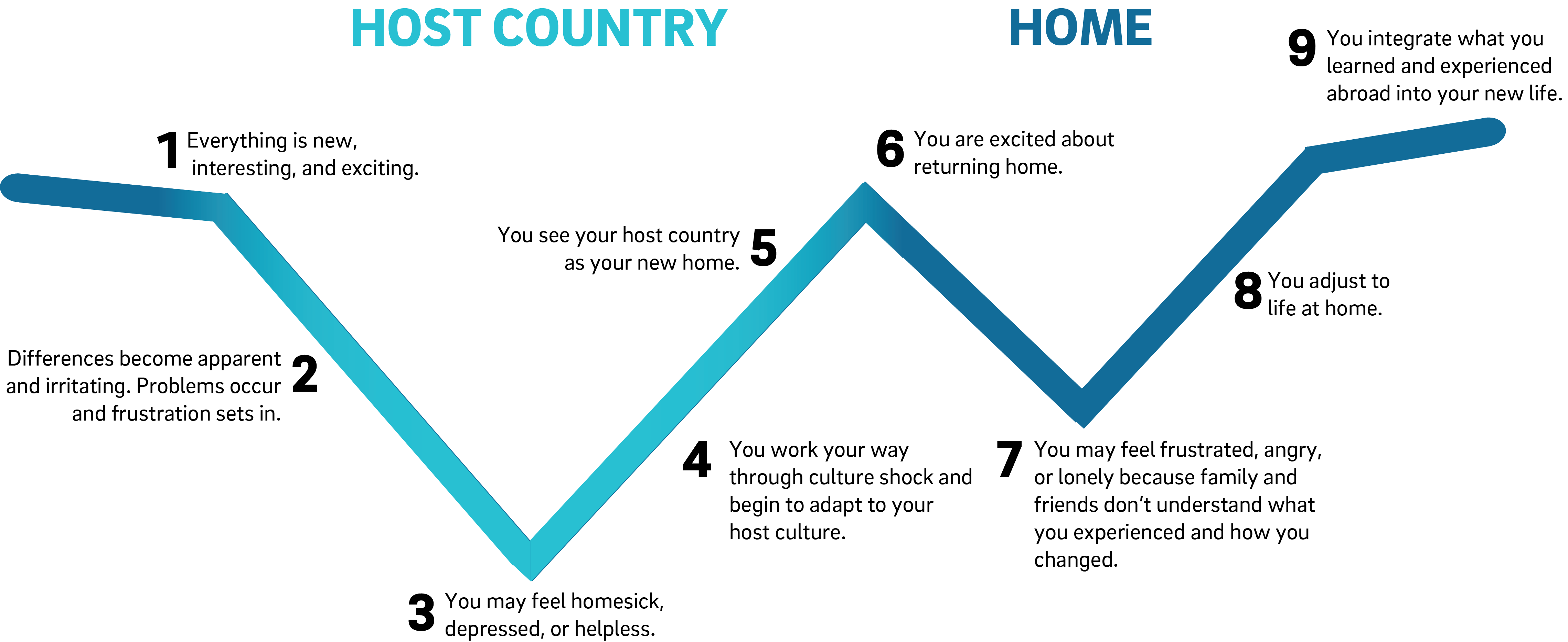Culture Shock is a term used to describe the challenges experienced by almost everyone who relocates to another culture for an extended period of time.
Common challenges include:
- Learning to cope with confusion with the language
- Frustration with different ways of doing things
- Isolation from your friends and family
- Sadness
- Homesickness (missing home)
- And more
These are all normal feelings and are part of adapting to a new culture.
Phases in adapting to a new culture can manifest in different ways and at different times, and include:
- Excitement upon arrival, everything is new and wonderful.
- Homesickness, frustration, fear and depression may occur.
- Beginning to adjust, make friends, and participate in activities.
- Difficulty returning to home country, reverse culture shock.

If you experiencing culture shock please know that you are not alone! Many international scholars coming to UC San Diego are experiencing it, too. The best way to overcome culture shock is to meet new friends and get involved in activities that you normally would do in your own country, or even try something new!
A good place to start is to come to the International Faculty & Scholars Office and join the many activities that we have designed for international visitors and their families.
Other ways to diminsh feelings of culture shock are:
- Plunge" into your host culture and wrestle with the differences.
- Keep an open mind; it is natural to have preconceived ideas and beliefs that come into question while abroad.
- Athletic activities like team sports or taking walks may be helpful.
- Get to know others at your host school or organization.
- Do not isolate yourself.
- Find a local person with whom you can discuss your frustrations and encounters.
- Learn as much as you can about your host culture.
- Maintain a support structure with others, particularly those going through the same experience. However, do not retreat into an American "clique" to avoid the discomfort of culture shock.
- Keep a journal. Record your impressions of new experiences and the transformations that are occurring within you.
Not all Americans are the same, but here are a few common American characteristics that you might find helpful to be aware of.
- Greetings
- Americans often will say, “How are you?” “What’s up?” “How’s it going?” as a means to simply say “Hello”, and “I’ll call you” “See you” or “Later” as a means to simply say, “Good-bye.” These statements are typically not taken literally.
- Americans are also very informal, and address each other by their first names from the time they meet, even with elders and people of authority.
- Meals and Typical Meal Times
- Breakfast: 5 a.m. - 10:30 a.m.
- Lunch: 11 a.m. - 3 p.m.
- Happy Hour: 4 p.m. - 6 p.m. Offered at many restaurants and typically consists of discounted prices for beverages and certain food items. Can also refer to a friendly social gathering with beverages and light snacks.
- Dinner: 5 p.m. - 10 p.m.
- Brunch: 10:30 a.m. - 3 p.m. (usually only on weekends or days off). A combination of the words "breakfast" and "lunch."
- Potluck: Term used in the context of an afternoon or evening gathering to mean "make an appetizer or dish that you can bring to share with the entire group."
- Remember that typical foods for meals in the US may differ from those in your home country.
- Dress/Clothing
- Dress is generally informal on campus. There is no one particular style adopted; however, it is important to keep in mind what is appropriate on campus and what is not.
- Gifts
- As a rule, gifts are given to relatives and close friends. They are sometimes given to people with whom one has a casual but friendly relationship, such as a host or hostess, but it is not necessary or even common for gifts to be given to such people.
- Honesty vs. Politeness
- In a question of honesty versus politeness, honesty wins. For example, if you are invited to an event and cannot/do not want to go, it is much better to refuse graciously and courteously than to accept an invitation and not go.
- Time and Punctuality
- In the U.S., great value is attached to time. Punctuality is considered an important attribute. You should try to arrive at the exact time specified for dinner, lunch, and especially appointments with professors, doctors, and other professionals.
- Gestures and Body Language
- Keep in mind that unspoken signals (body language) by others may not mean what you think. Various gestures are automatic and vary from culture to culture.
- Inappropriate Behavior
- Actions involving sexual intimidation, sexual abuse, sexual assault, engaging in obscene behavior, or other unwelcome, intimidating, hostile, abusive, or offensive conduct of a sexual nature are strictly prohibited by law and are considered very serious matters in the U.S. and in the UC San Diego community.


